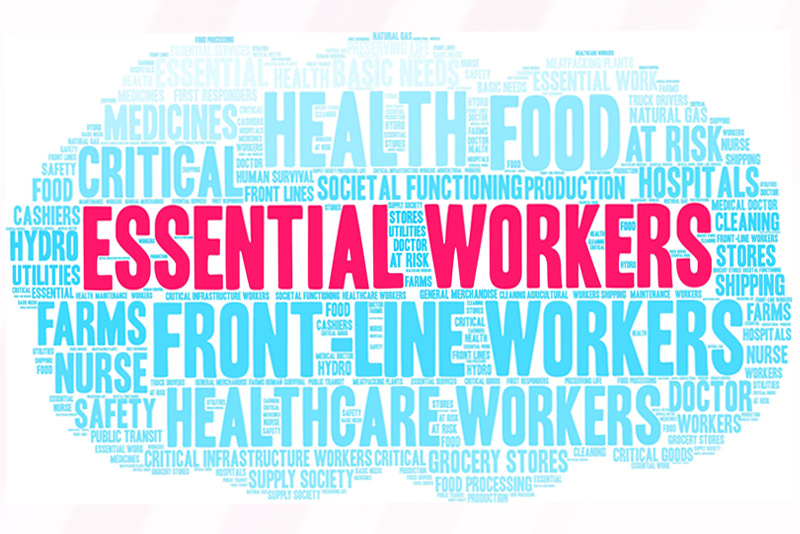The new coronavirus COVID-19 has created numerous challenges for employers and insurers, and possible policy changes may become necessary in the wake of the widespread infection. While chart review will continue to be vital, there are other concerns regarding coverage requirements and standards across the U.S. states. These are varied, and based on the type of occupation, the size of the business and its structure. Most states do have a dedicated workers’ compensation court system to ensure that the benefits are awarded fairly and to deserving workers.
Workers’ compensation insurance generally doesn’t cover routine community-spread illnesses like the flu and cold since it is difficult to connect those to the workplace. However, COVID-19 with its unprecedented impact, cannot be treated like the common flu or cold. Many jobs that were hitherto considered safe have become dangerous and risky. In the current scenario, with the vaccines having arrived, the important question is, after the healthcare and other frontline workers right in the path of the virus, which categories of workers should receive the vaccination. In this context, the definition of “essential worker” becomes very significant.
In the race to inoculate more than 300 million Americans, the decision as to who should get the shots first is a very significant one. The Advisory Committee on Immunization Practices (ACIP) says that the second wave of vaccinations should include frontline essential workers, i.e. around 30 million people who work in grocery stores, public transportation, meat plants and other businesses; and people age 75 and older. The third wave should cover other essential workers, around 57 million people, alongside people aged 65 – 74 and those with high-risk medical conditions. The U.S. Department of Homeland Security defines essential workers as those who perform a range of services and operations that are typically essential to continue critical infrastructure operations, namely, in sectors ranging from energy to defense to agriculture.
States follow federal or their own guidelines to define essential workers, and generally workers in the following sectors may fall under the essential worker category.
- First Responders (firefighters and police) and health workers, whom people depend on during emergencies.
- Food and Agriculture: A number of outbreaks at the onset of the pandemic were in food-processing plants, and meatpacking facilities among others.
- Education: A pandemic shouldn’t prevent children from advancing academically. So, teachers and their support staff, daycare employees have to be given priority to get vaccinated.
- Manufacturing: This is one sector where remote working is not possible, so employees in this sector should be vaccinated at the earliest.
- U.S. Postal Service Workers: These employees ensure that the packages are delivered safely to the correct addresses, and provide other important services. There are more than 490,000 people in this group.
- Public Transit Workers: They also perform essential work such as making it possible for other essential workers to get to their jobs.
- Workers in Correctional Facilities: These being closed areas, there is every likelihood of the virus spreading quickly.
- Grocery Store Workers: These supermarket employees need to be kept safe because their service is essential to make it possible for people to have the groceries and other vital food they need when restaurants and eateries remain temporarily closed.
While the above mentioned comprise frontline essential workers, there are other workers too who perform essential work such as the following.
- Transportation and Logistics: These employees make sure that store shelves remain stocked and other necessary supplies are transported to the required places.
- Finance: The COVID-19 has brought along with it a recession period, and people need financial advisors to help them tide over the situation.
- Information Technology and Communication: This category is included considering the significance achieved by videoconferencing and other internet technologies during the pandemic.
- Shelter and Housing: Construction workers and contractors also perform essential work such as the construction and repair of houses and other buildings.
- Energy: Many occupations in this sector, such as oil extraction and mining, cannot be performed remotely.
- Media: This sector has also assumed tremendous significance considering that accurate information needs to be made available to the public during this health crisis.
- Legal: Legal professionals remain essential for many proceedings, even though the demand for legal services had declined in 2020.
- Engineers: These professionals have a major public safety role to play because they need to guarantee that projects meet the proper standards and guidelines.
- Water and Wastewater: Workers in this sector have to be maintained to ensure that the water supply is safe.
Workers in the above-listed professions could be eligible to receive the vaccine if they fall within the definition of essential worker as per their state laws /federal regulations followed. If they have contracted COVID-19 because of exposure to the coronavirus while on the job or while traveling for work, they may be eligible for workers’ compensation benefits. A workers’ compensation attorney, with the support of medical review services, can locate the medical evidence necessary to support the claim.




